Columbus introduced their new general manager on Thursday as Don Waddell had a press conference with his new team. Waddell was recently with the Carolina Hurricanes but has moved on for this new challenge. The Blue Jackets are entering their 24th season as a franchise and have yet to reach a Conference Final, so there is a lot of pressure for success.
It was interesting to see this quote:
In NHL parlance, 'win' means Stanley Cup. This is something coaches/GMs will say to show faith in their team, but being that direct about it in an odd choice. To go from a Lottery pick to the Stanley Cup in 12 months would be remarkable (and some would say impossible). He could have just said "we have a great mix of young, high-end prospects and good veterans that we can win with down the road" or something to that effect. This specific word choice is a curious one because it's not as if people should expect a Stanley Cup, but now the floor is set for a big, quick turnaround. Anything else is a failure, and that's setting a high bar very early.
*
For the second game in a row, one of the teams in the Dallas-Edmonton series blew a 2-0 lead to lose the game by multiple goals. This time it was Edmonton making the comeback as they fell behind thanks to goals from Wyatt Johnston and Esa Lindell less than six minutes into the game. However, Ryan McLeod and Evan Bouchard tied things up before the end of the period, and then Mattias Janmark (SH) and Leon Draisaitl double the Stars with goals in the second period. Mattias Ekholm had the empty-netter with under two minutes on the clock to seal the game.
Bouchard had that goal, two total shots, two blocks, and two hits in a good multi-cat night. Connor McDavid had three helpers, five shots, and a hit in the win. Zach Hyman had an assist, five shots, two PIMs, and five hits for a good multi-cat night in his own right.
Stuart Skinner stopped 20 of 22 shots for the win.
With the series tied 2-2 it shifts back to Dallas for Game 5 on Friday night.
*
This is the final team in my offseason reviews of the 16 non-playoff squads. Today's focus is on the St. Louis Blues, who finished with the most points (92) of all teams that missed the postseason.
We have already gone over the San Jose Sharks, the Chicago Blackhawks, the Anaheim Ducks, the Columbus Blue Jackets, the Montreal Canadiens, the Arizona Coyotes (now in Utah), the Ottawa Senators, the Seattle Kraken, the Calgary Flames, the New Jersey Devils, the Buffalo Sabres, the Philadelphia Flyers, the Minnesota Wild, the Pittsburgh Penguins.
Data from Natural Stat Trick, Evolving Hockey, HockeyViz, and Frozen Tools with salary cap data from Cap Friendly. Any tracking data is from AllThreeZones unless otherwise noted.
What Went Wrong
When we get to a team that finished with 92 points, there really isn't a whole lot that went terribly wrong. It was a turnover year for the team as the previous couple of seasons had seen key players like Ryan O'Reilly, David Perron, and Vladimir Tarasenko move along as the future was handed to the likes of Robert Thomas, Jordan Kyrou, and Pavel Buchnevich.
St. Louis did struggle to score, tying the Columbus Blue Jackets with 234 goals, good for 24th in the league. They scored 45 power play goals, tying them with Winnipeg and Calgary for 23rd in the league. However, that is a tale of two seasons.
The team fired coach Craig Berube in mid-December and promoted Drew Bannister to the position. When they fired Berube, the team was 31st in the league by goals per 60 minutes with the power play, exceeding only Washington, and those two teams were considerably lower than everyone else (St. Louis was 19% worse by this measure than 29th-place Chicago). From that point onward, the Blues were 12th in the league by PP goals per 60 minutes, exceeding teams like Nashville, Detroit, Vancouver, and Boston.
That slow start did hurt the overall fantasy value of their top players. It was a 28-game stretch that saw their four key forwards – Kyrou, Thomas, Buchnevich, and Brayden Schenn – each post just four power play points. Considering Thomas and Kyrou finished the year with 27 and 21 power play points, respectively, there was an opportunity for one, if not two, of those players surpassing 30 PPPs. It could have easily been a 90-point season for Thomas had the power play not been so poor to start.
In that sense, it was a letdown season for Schenn. He managed at least 20 goals for the third straight season, and did post a huge hit total again with 169. Add that to his rate of over two shots per game (the first time he did that in three years), 56 penalty minutes, and 12 power play points, and it was a fine multi-cat season. However, his 0.56 points per game was his lowest mark in a decade and nearly 35% lower than his average from the prior two seasons.
Schenn's big problem was a lack of assists, namely at even strength. He had just 18 such assists, nearly half his rate from the year prior (35). Tracking data had Schenn with 4.34 scoring chance assists (assists on teammate chances) per 60 minutes at 5-on-5, which was well above average but not quite among the high-end performers:

That is a drop from what he did the year before:

With whom Schenn played also matters: in 2022-23, his most-common line mate was Kyrou, and he had 26 even strength goals; in 2023-24, his two most-common line mates were Jake Neighbours and Brandon Saad, and they combined for 40. Add that to some decreased PP usage as the season wore on, and it makes sense that Schenn's assist totals, and thus his point totals, decreased.
It was a disappointing season from Kyrou, which is weird to say of almost any player who posts 31 goals, 67 points, 21 power play points, and 251 shots. However, coming off a season where he had 37 goals, 73 points, 23 power play points, and 272 shots and seemed to be on the ascent to bigger things, it was a letdown.
As with many things about the Blues, a bad start sunk Kyrou's overall fantasy value. In his 28 games with Berube, he managed five goals, 17 points, four PPPs, and 89 shots. He was shooting 5.6%, which was very weird for a guy who shot 14% over his prior 208 games. In 54 games with Bannister behind the bench, Kyrou had 26 goals, 50 points, 17 power play points, and 162 shots. In 82 games, that works out to 39 goals, 76 points, 26 power play points, and 246 shots. That is a lot closer to what fantasy owners were hoping for.
There is a lot of optimism for a Kyrou rebound. In 2022-23, his scoring chance contributions (individual chances plus chance assists) was 7.53, or about the middle of the league. For a player with shooting talent like him, that's a fine number. However, he improved dramatically in this regard in 2023-24, and he was truly among the elite in the NHL:
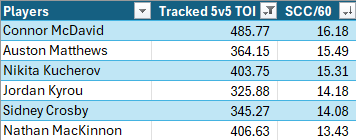
The big change for Kyrou was adding a lot of scoring chance assists, winding up among the upper echelon in this regard. He did improve his primary assist rate at 5-on-5 by 25% from the year before, so there was a tangible upgrade in his assist numbers to support better underlying playmaking data. He increased his primary assist rate despite the team's goal rate with him on the ice at 5-on-5 declining, so that is a great sign for him individually. Yes, it was a down year, but he still has a very bright fantasy future (though a lack of hits continues to hurt his multi-cat value).
It was another down year for Torey Krug. He managed 0.51 points per game, the same as the year before, with these last two seasons being his lowest points/game totals since 2015. Like Schenn earlier, a drop in scoring chance assists is starting to really hurt. Here is how he's fared in the last three seasons relative to the league average for defencemen:
| Krug SCA/60 | League SCA/60 | %Diff. From Lg. Avg. | |
| 2021-22 | 2.12 | 1.19 | +78.2% |
| 2022-23 | 1.29 | 1.23 | +4.9% |
| 2023-24 | 1.44 | 1.27 | +13.4% |
While there was a bounce back in 2023-24, he was nowhere close to as proficient in 2021-22, the last time he surpassed 0.9 assists per 60 minutes at 5-on-5. He was at 0.88 this season, and that's still a very good mark across the league (about the 78th percentile) but a drop from his heyday a couple of years ago (87th percentile).
The second problem is his zone entries. Just two seasons ago, he was very good at gaining the zone with control when he had the puck on his stick, and the team was creating chances off those entries at a high (but not elite) rate:

This past season showed declines nearly across the board on his zone entries:

With the power play struggling early, and Krug not getting nearly as involved in the offence, there wasn't much production to speak of for fantasy owners. It was nice to see him exceed 2.0 shots per game while setting a career-high with 111 blocks, and that helps his multi-cat value, but he's a player drafted because fantasy managers are hoping for 50-point potential. It is fair to ask whether he has that anymore.
Justin Faulk also saw big decreases. His points per game fell from 0.61 to 0.5, his shots per game from 2.39 to 2.2, and he scored just twice in 60 games. That he lost nearly 1:30 per game in ice time is a big problem for him because he normally thrives with peripherals like shots, hits, and blocks, and while they were all fine on a per-game basis, continued loss in ice time will not help in this regard.
Lastly, it was a disappointing season for Pavel Buchnevich. He saw big declines by goals, assists, and hits per minute, and it led to a very down year for him. I will note that he shot a four-year low of 13% (three-year average of 17.2% prior) and he registered a point on just 59.4% of goals scored with him on the ice, his lowest rate since his rookie year and far lower than his three-year average of 72.4%. There was a bit of bad luck here.
It wasn't all bad luck, though. Like Krug earlier, he struggled in a key playmaking metric, and this one was high-danger assists. The tracking data classifies these types of assists as either seam passes or those from behind the net because they can lead to high-quality shots from teammates. Here is how Buchnevich has fared by high-danger assists relative to the league average over the last three seasons:
| Buch HDA/60 | League HDA/60 | %Diff. From Lg. Avg. | |
| 2021-22 | 2.06 | 1.09 | +89% |
| 2022-23 | 1.34 | 1.09 | +22.9% |
| 2023-24 | 0.81 | 1.03 | -21.4% |
Unlike Krug, there was no rebound from 2022-23 to 2023-24 for Buchnevich's high-danger assist rates. Considering the Blues are a team that live and die by creating shot quality, this is a big problem for them and his fantasy value, and there is a very good reason he had a five-year low by both total assists/60 at 5-on-5 and primary assists/60 at 5-on-5.
Unlike some other players, there was no rebound under Bannister's stewardship, and Buchnevich's assist rates at 5-on-5 actually declined with the new coach. Buchnevich has been too good for too long to be cooked before he turns 30 years old, but it'll be interesting to see what the Blues do this summer because he has one year left until free agency.
What Went Right
It was a magnificent season for Robert Thomas, and likely one where he cemented himself as an upper-echelon centre (though still a tier below the super-elite like Connor McDavid and Nathan MacKinnon). His 26 goals, 60 assists, 27 power play points, 170 shots, 48 penalty minutes, 47 blocks, and 16 hits were all career-highs. He skated nearly 21 minutes a night, and that helps, but he was also tasked often with shutting down the opponent's top line. He turns 25 years old this summer, so he's in the thick of his prime, and may not have even reached his peak yet.
Though Thomas's scoring chance contribution rate at 5-on-5 didn't quite reach Kyrou levels, he was still in the upper-tier of forwards, and among players who've produced 100-point seasons:
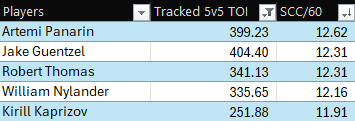
While Thomas's playmaking data was always, and remains, very strong, he rebounded by individual scoring chances, and the proof of that is increasing his 5-on-5 goal scoring rate by 32%.
There isn't much else to say here. Thomas may not reach the true elite levels of production of the MVP-calibre centres in the league, but he can be a 100-point player if things go right. He is just a tremendous player.
Jake Neighbours had a breakout year with 27 goals, 38 points, 145 shots, and 138 hits in 77 games. He is still far from a finished product, or even a proven player, but the power play turned around once Bannister was hired and started using Neighbours more in a net-front role:
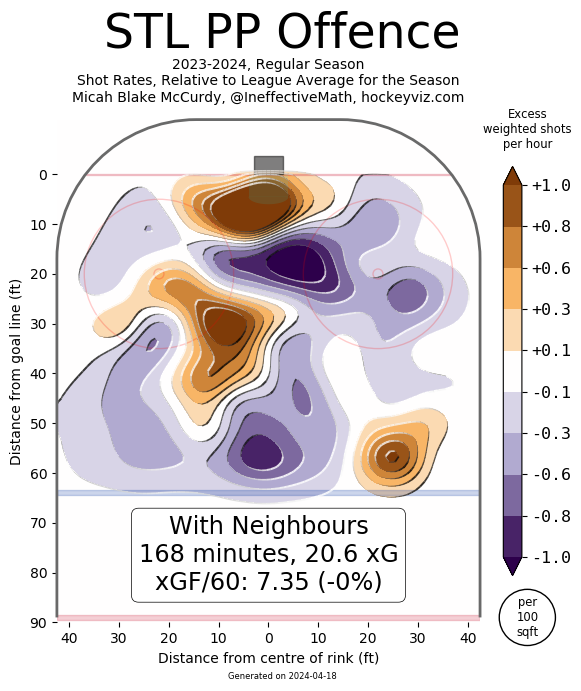
He is still a complementary player at this stage of his career, but if he can earn regular top-6 minutes with the likes of Kyrou, Thomas, and Buchnevich (if he sticks around) while getting top power play time, repeating a 25-goal season is very possible. Add in his physical play and there's a good multi-cat option here.
A quick shoutout to Brandon Saad, too. A lack of peripherals means meagre value in some fantasy formats, but 26 goals gave him his seventh season with at least 20 tallies. One of the more consistent players of the last decade.
Of course, the big season came from goalie Jordan Binnington. While there were some (myself included) who thought Joel Hofer may take over the starting role, Binnington finished with 55 starts, 28 wins, a .913 save percentage, and a 2.84 goals against average. That is a very good fantasy season, and he was a top-5 fantasy goalie in standard Yahoo! leagues because of it.
That also belies how good he actually was. The Blues were not that good defensively and gave up a lot of shots right around Binnington's crease:
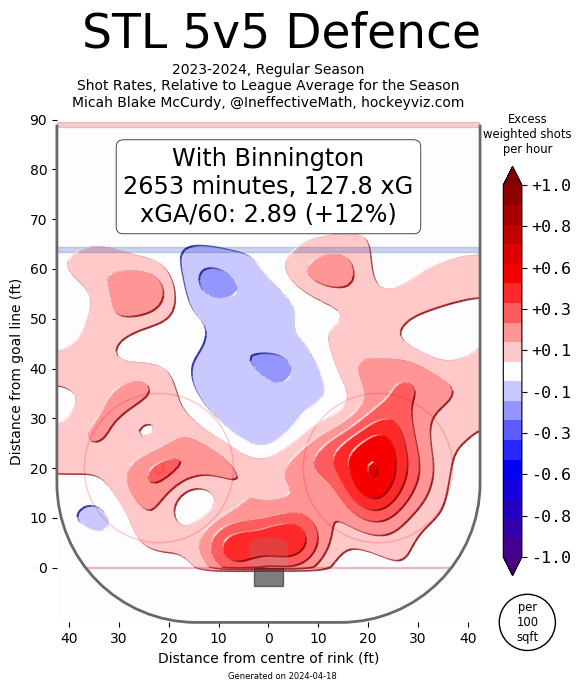
Among 41 goalies with at least 1500 minutes of 5-on-5 play, Binnington finished eighth by high-danger save percentage and ninth by overall save percentage. At all strengths, his goals saved above expected mark was second only to Winnipeg's Connor Hellebuyck. On a per-minute basis, his goals saved above expected rate was third, behind Hellebuyck and Jacob Markstrom. It was a big bounce back season for him and if the team wants to get back to the playoffs, he'll have to do it again.
Where They Go From Here
Making it back to the playoffs is much easier said than done. St. Louis's top two prospects are Jimmy Snuggerud and Dalibor Dvorsky. The former already stated that he's returning to college for one more year and the latter was a 2023 first-round draft pick. It is possible that Dvorsky makes the NHL roster in 2024-25, but this has long been a franchise that does not rush its prospects; Thomas had three seasons of under 15 minutes a game before earning a meaningful role while Kyrou had the same (though his injuries also played a factor). All that is to say that even if Dvorsky is a full-time player in 2024-25 – which is by no means a lock, or even likely – he is still unlikely to have a big role on the team, which means fantasy irrelevance.
St. Louis does have over $15M in cap space this offseason with few replacements to make: Scott Perunovich and Nikita Alexandrov are both RFA while Sammy Blais, Kasperi Kapanen, and Marco Scandella are UFA. Even if both RFAs are re-signed, and Blais and/or Kapanen are brought back for cheap, there could be around $9M-$10M in cap space to play with. That is enough to make one big splash or bolster the depth. Given the history of this team, I would suspect it's the latter, and they do need better depth.
There is also a decision to make with Buchnevich. He has a 12-team no-trade clause, so that does muddy things, but he has one year left on his current deal and will be 30 years old when his next contract starts. This is a team that hasn't been shy to hand out long-term contracts to aging players but he's also a player that could fetch a solid return on the trade market, especially if they eat some of his cap hit or attach a mid-level prospect (or draft pick) to the trade package; he has Future Tampa Bay Lightning written all over him. It would also help the team's timeline to get back to a top-tier team in the West by focusing around Thomas, Kyrou, and the prospects.
If this team wants to get back to the postseason, there will need to be improvements on the blue line. It is fair to wonder just how much is left in the tank of Krug, Faulk, and Nick Leddy, while Perunovich just cannot stay healthy. Colton Parayko has a full no-trade clause, so unless he wants to leave, he's not going anywhere. They could add a top-4 defenceman in free agency, but it wouldn't be enough to turn the entire ship around; the Blues need their veterans (and Perunovich) to be better, plain and simple.
Bolstering the depth should be a priority. This team got crushed when their top line was off the ice and Schenn, Oscar Sundqvist, Sammy Blais, and Kevin Hayes are not going to be enough to get the team back to prominence. It will be interesting to see how they address that.
In reality, this is a team that should be thinking of 2027 or 2028 rather than 2024 or 2025, but that's not how this franchise usually operates. There is enough talent here, with the prospects and some good depth signings, to make noise in the West, but they are a long way from the Dallas/Colorado/Edmonton tier of teams. How their management group, er, manages that reality with the desire to be a playoff team again will be fascinating to watch unfold this offseason.

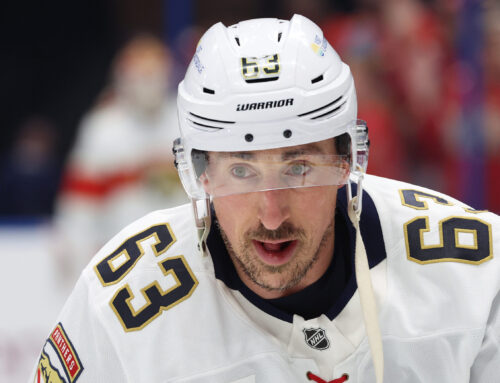
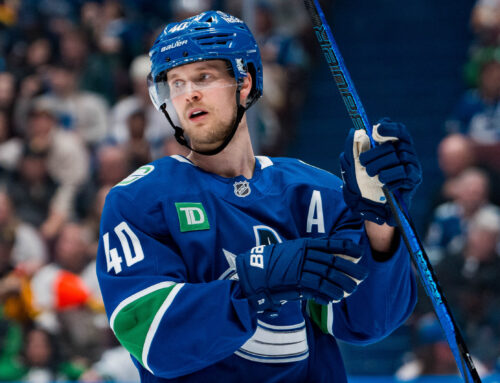
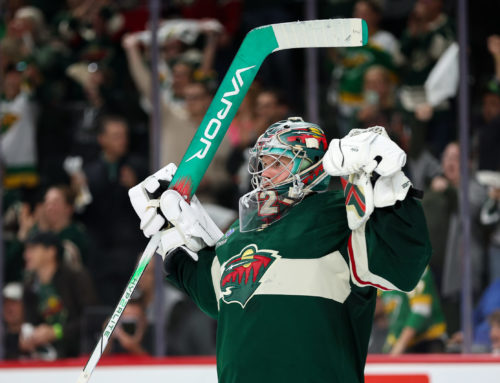

 FLA
FLA EDM
EDM MIN
MIN DAL
DAL UTA
UTA VAN
VAN STL
STL L.A
L.A TOR
TOR BOS
BOS
